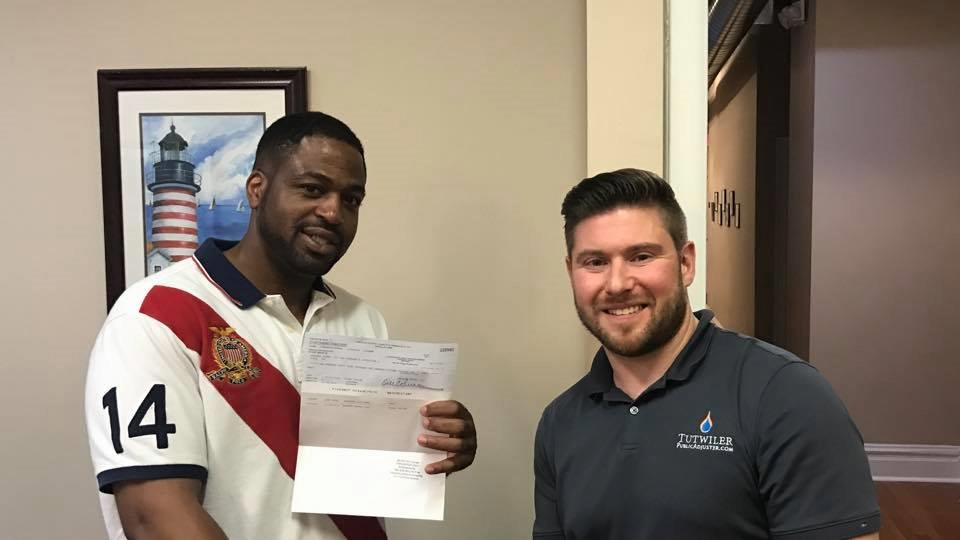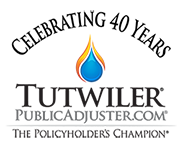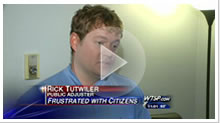
Zach was also very patient and responded to every call and email. I definitely would recommend Zach for your public adjuster. He is honest and caring and that is very important in today’s society.
– Pittsburgh Homeowner
Understanding Frozen Pipe Leak & Ice Dam Claims
If you are among the many home and business owners who have experienced a broken pipe leak from this winters cold snap a public adjuster can help you properly document and file your water damage claim so you get a fair settlement. As your claims advocate, the public adjuster will also make sure the restoration and dryout is done properly and your settlement money is not eaten up by unnecessary charges.
Water damage is among the most common causes of insurance claims. When standing water gets trapped in pipes and the temperature plummets below freezing, the frozen water expands and bursts a hole right through the pipe or breaks the pipe at its seam. If it is not caught in time and the water starts to thaw out, you could be facing massive loss and damages.
Most of you reading this want to know if your frozen pipe damages are covered by your insurance policy. In general, water damage from a burst pipe will be covered by a standard homeowners and commercial insurance policy. But remember, not all insurance policies are alike and each property owner should take the time to check for coverage either by calling their agent or reading their specific policy. Some policies require the insured to maintain a certain temperature in buildings and homes. Others require homeowners to have a working alarm system so in the event the heat is off, it sends an alarm to a central monitoring location so the policyholder or a service company is notified and can make the necessary repairs. Failing to maintain policy requirements with these types of clauses in them can trigger a claim denial, so beware. How you report a water-damage claim to your insurer can also make a huge difference. Do not use the word “flood” under any circumstances because insurance companies have a specific definition of the word flood and floods are only covered under a separate policy. Even using the word in a casual context when making a call to your agent can cause you trouble later. Always refer to your claim as “water damage.”
Common Myths about Pipe Bursts
The bad news is that policies typically do not afford coverage to the damaged pipes themselves. So the property owner will be responsible for repair or replacement of the broken pipes and any associated plumber costs.
One other water damage claim myth we have seen in the news is that “most restoration companies bill insurance companies directly for the dry out and other emergency services.” This can lead to one of the biggest financial mistakes a property owner can make.
Protect Your Frozen Pipe Leak Claim by Understanding Your Responsibilities
Just as it is important to understand coverage, it is a duty of the policyholder to start the cleanup, dry out, and mitigation process in order to prevent further damage from occurring. Naturally, there will be pressure on the policyholder to hire qualified and professional help. Given this high-pressure environment, policyholders need to keep their eye on the ball or in this case the money. Unscrupulous contractors will no doubt try and take advantage of many folks and it is important the policyholder read and understand the work authorization forms that will be pushed on them by the emergency service crews. Even if they are supposedly sent from the carrier! Keep in mind that you are signing these forms, not your insurance company. Remember that in catastrophe type situations such as widespread frozen pipe leaks, price gouging can occur. Your insurance company is not likely to pay anything but “reasonable and necessary” clean-up and repair cost. The balance of the bill will be your responsibility since you agreed to pay when you signed the work authorization form.
You can avoid this problem by trying to add language to the work authorization stating that: “any billing is subject to an agreement and approval by the insurance company.” Some emergency service companies may balk at this, but others may agree so they don’t lose the business. Having the clout of your insurance company in disputes regarding emergency services costs can be a powerful ally. If you do not have this spelled out on the emergency service agreement contract up front, you likely have the burden to try and negotiate any dispute yourself. Your best bet to avoid this problem is have to the insurance adjuster and the contractor agree on the scope and price of the loss before commencement of the work. Unfortunately, in large catastrophe situations, it may be days or weeks before an adjuster gets out to inspect your loss. So while a claim may be reported and a claim number assigned, remember you are going to be on your own in the initial stages of the claim. Please pay attention to all that is being done and said.
We also suggest you keep a daily diary of all conversations and commitments that take place, with names, phone numbers, emails, business cards etc preserved for later reference if needed. Use email to send confirmations, instructions, etc. that may be given by any party to you about your loss.
Your water-damage claim also might be denied if your insurer concludes that you are responsible for the pipe bursting in the first place. Most pipes that burst do so because they freeze. If you left your home unheated during freezing weather, your insurer can cite your “Negligence” as the basis for denial. Or if you failed to maintain or did not take the precautionary measures listed below, the carrier may cite “normal wear and tear” as their basis of denial. An example of this maybe an old or corroded pipe.
This is when using an experienced public adjuster to negotiate your claim can be helpful.
Precautions to Prevent Freezing Pipes:
Here is a list of things you can do to help protect your pipes from freezing during the winter:
- Clean your gutters so melting snow and ice can flow freely
- Turn on your faucets and allow them to drip slowly. Moving water will prevent freezing.
- Heat your house to a minimum of 65 degrees in the winter
- Open cabinet doors below sinks. It will help allow warm air to circulate.
- Drain your water system if you’re away for an extended time.
- Disconnect all gardening hoses and install covers on all outside faucets.
- Identify the location of the main water valve and the valve on your water heater. (Learning the location of these valves may come in handy during an emergency.)
- Wrap pipes nearest exterior walls and in crawl spaces with pipe insulation or with heating tape. This can prevent freezing, especially for interior pipes that run along outside walls.
- Close all windows near water pipes; cover or close open-air vents. Freezing temperatures combined with wind drafts can cause pipes to freeze more frequently.
- Heat your basement and consider weather sealing your windows.
- Insulate outside walls and unheated areas of your home.
- If you plan to be away from home for an extended period of time, shut off water supply valves to your washing machine.
Monitor Freezing Pipe Conditions
- Allow a faucet to drip slightly (lukewarm water) in order to minimize freezing.
- The first sign of freezing is reduced water flow from a faucet.
- Check your faucets for water flow and pressure before you go to sleep and again when you wake up.
- Check pipes around your water meter, in unheated areas, near exterior walls and in crawl spaces.
- These tend to be vulnerable to freezing conditions.
- Identify cold air drafts coming in from a flue or chimney chase and caulk gaps that are near pipes.
If a Pipe Freezes
- If a faucet or pipe inside your house freezes, you can thaw it using a good hair dryer. (For safety purposes, avoid operating a hair dryer around standing water.)
- To thaw a frozen pipe, heat water on the stove, soak towels in the hot water and wrap them around cold sections of the pipes.
- When thawing a pipe, start thawing it nearest to the faucet. Make sure the faucet is turned on so that melted water can drip out.
If a Pipe Bursts
- Shut off water at the main valve.
- If the break is in a hot water pipe, the valve on top of the water heater should be closed.
- Call a plumber. Keep an emergency number nearby for quick access.
Consider talking to a professional Public Adjuster with the experience needed to get the settlement you deserve. If you would like help with your frozen pipe burst insurance claim and want to understand your options, give us a call at 813-412-8357 or contact us.

